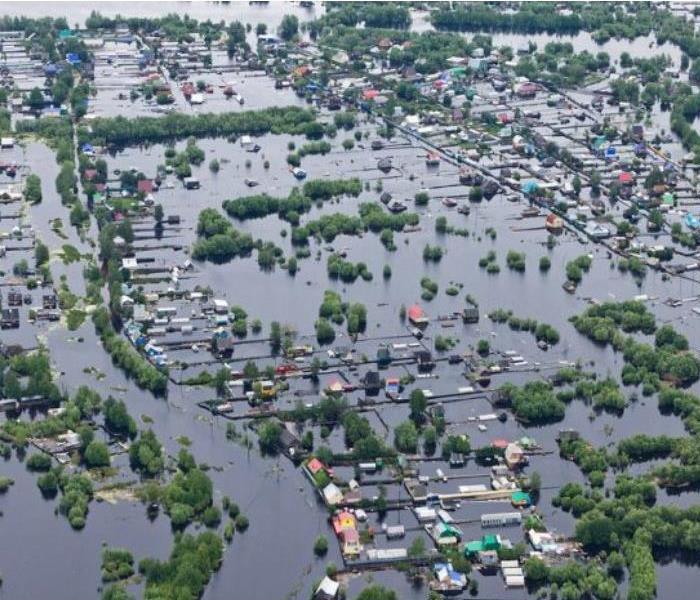Flood Insurance 101: What Homeowners Need To Know
10/5/2017 (Permalink)
Flood Insurance 101: What Homeowners Need To Know
Source: Homes.Com
Author: Becky Blanton
The fact is – any property can flood. Your home doesn’t have to be under five feet of water from hurricane flood surges to suffer flood damage. Normal amounts of rainwater can drain under your home, and flood your basement or the lowest floor level, causing flood damage. This kind of flooding can cause mold, increase the risk of termites and cause electrical problems.
More than 75% of homeowners devastated by flooding unfortunately discover they should have had flood insurance. The sad thing, experts say, is that flood insurance is not that expensive – typically $450 to $600 a year for the average home. When you weigh the cost of flood insurance against replacing your entire home $100,000 to $500,000, it only makes sense to buy it, whether you believe you’ll need it or not.
“People may say things like, ‘I live on a hill, I don’t need flood insurance’,” Diana Herrera, a FEMA flood insurance specialist said. “If I had a dollar for every time I’ve heard that, and those homes were flooded…”
Other common reasons people give for not buying flood insurance include:
- “I’m not in a flood zone.”
- “I’m not anywhere near water.”
- “I’ll never need it, it’s money wasted.”
- “My homeowner’s insurance will cover it.”
- “It’s not available.”
- “My realtor told me the property would never flood.”
Unfortunately, water tables may fill up. There may be a landslide or a dam miles away can burst or overflow due to rain. Drainage systems in your neighborhood may become blocked. Low spots in your yard, or a neighbor’s, can collect water rather than distribute it away from your home. Poor drainage is a number one reason for flooding for homes on a hill.
Your Insurance Agent’s Responsibility
By law, it’s your realtor’s responsibility to make sure you, the home buyer, are aware of any and all risks to the property you are buying – that includes telling you that you are, or are not in a flood zone, and if your property is in a high-risk area for earthquakes, tornadoes, landslides, hurricanes or other natural disasters. They’re not telling you that bad things will happen, but that they could. If your realtor doesn’t disclose this information, ask them. It is their responsibility to identify what risks you may be exposed to. If you choose not to purchase insurance after being informed of the risks, your realtor or insurance agent may ask you to sign a disclaimer to protect them and their agency in case you do suffer damages from a natural disaster.
Property Checklist
“When you’re buying a home, any home, anywhere, you should check certain basic things before buying,” Herrera said.
- “Check first with your realtor,” she said. “States have disclosure laws. If the property has ever flooded for any reason, it must be disclosed.” This not only lets the homebuyer know flooding is possible, but that it has happened before. Check to see if the property is in a low, medium or high risk and what those terms mean.
- Talk to your community’s floodplain manager. These officials are typically found in the zoning, planning, permitting or mapping offices of your city or county.
- Talk to your insurance agent. They should know what is happening in your community regarding flood insurance. They should also be able to explain the National Flood Insurance Program, what the rules and requirements are, and what documents they need (elevation certificate, etc.) to write a flood insurance policy.
- Whether you’re building a new home or buying one, get a copy of your site elevation plans. If your lowest floor is higher than the average requirement for flood insurance, you can save money on your insurance. For insurance rating purposes, a building’s flood proofed design elevation must be at least one foot above the Base Flood Elevation (BFE) to receive full rating credit for the flood proofing. If the building is flood proofed only to the BFE, the flood insurance rates will be considerably higher. “For every foot higher your floor is above the BFE, you can save as much as 50% on your insurance premium,” Herrera said.
- Get a flood proofing certificate. This certification is issued by a registered professional engineer, or architect. It certifies that “the construction of a structure is in accordance with accepted practices for meeting the flood proofing requirements in the community’s floodplain management ordinance.” This documentation is needed for both floodplain management requirements and insurance rating purposes.
Additional Resources
If you own or are buying a home, check out the National Flood Insurance Program (NFIP). NFIP is not just an insurance program. According to the NFIP, “the program is a comprehensive flood risk management program that maps floodplains, issues hazard mitigation grants, and helps community’s implement safe local floodplain ordinances. The NFIP communicates flood risk and promotes community practices to mitigate that flood risk. Strong awareness tools combined with smart and safe floodplain management practices can help guide communities towards less risky development, and result in floodplains that have more room for rivers to safely flood.”
When fire or water damage strikes, you need professional help to get your property back to preloss condition. SERVPRO of Wayne provides 24-hour emergency service and is dedicated to being faster to any size disaster. Our highly trained technicians can respond immediately to your residential or commercial emergency.??
Contact us at 973-546-4977 if you have a service need or click here to visit our website to learn more about SERVPRO of Wayne's System Services.
Like Us on Facebook or Follow us on Twitter, Google+, or Instagram and follow the tips, tricks and advice we share with our community.






 24/7 Emergency Service
24/7 Emergency Service
